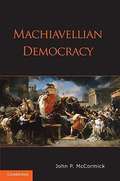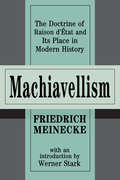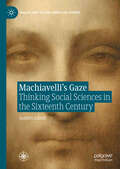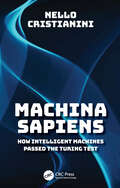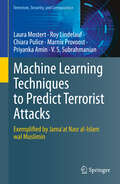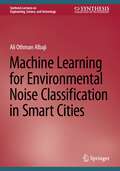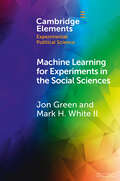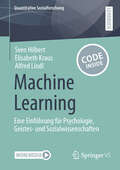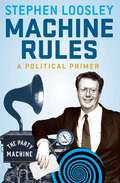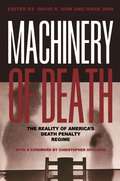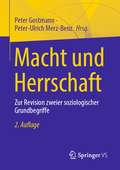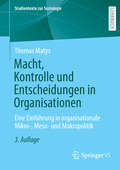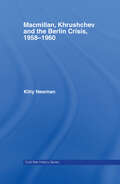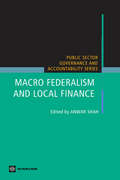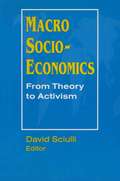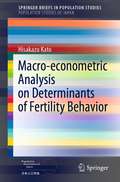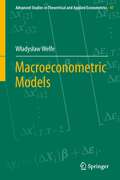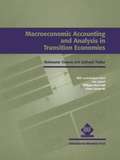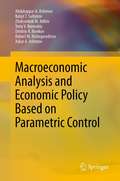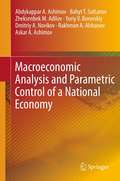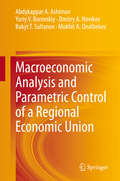- Table View
- List View
Machiavellian Democracy
by John P. MccormickIntensifying economic and political inequality poses a dangerous threat to the liberty of democratic citizens. Mounting evidence suggests that economic power, not popular will, determines public policy, and that elections consistently fail to keep public officials accountable to the people. John P. McCormick confronts this dire situation through a dramatic reinterpretation of Niccol- Machiavelli's political thought. Highlighting previously neglected democratic strains in Machiavelli's major writings, McCormick excavates institutions through which the common people of ancient, medieval, and Renaissance republics constrained the power of wealthy citizens and public magistrates, and he imagines how such institutions might be revived today. Machiavellian Democracy fundamentally reassesses one of the central figures in the Western political canon and decisively intervenes into current debates over institutional design and democratic reform. Inspired by Machiavelli's thoughts on economic class, political accountability and popular empowerment, McCormick proposes a citizen body that excludes socioeconomic and political elites and grants randomly selected common people significant veto, legislative, and censure authority within government and over public officials.
Machiavellism: The Doctrine of Raison d'Etat and Its Place in Modern History
by Friedrich Meinecke Werner Stark Douglas ScottHere is a study, by a recognized master in the field of intellectual history, of the challenge put by Machiavelli to the idea that there is a universal moral law governing human behavior. Should the political leader act according to the maxim of "my country right or wrong," or should elites follow the principle of "let justice be done?" Friederich Meinecke, an acknowledged founder of cultural history as a field, follows the discussion of this theme from Machiavelli through such major figures as Richelieu, Frederick the Great, and Hegel, and presents conclusions of enduring significance.
Machiavelli’s Gaze: Thinking Social Sciences in the Sixteenth Century (Italian and Italian American Studies)
by Sandro LandiThis book examines Machiavelli in contemporary or past realities through the way in which he read, wrote, related to cultures distant in time and space—a first in the field of Machiavellian studies. It proposes and experiments with a change of perspective: in essence, it is not interested in what Machiavelli probably was, but in what Machiavelli did. In this perspective, Machiavelli remains a paradoxically still little-explored historical case. Issues and methods developed in recent decades by intellectual history, the history of reading, and cultural anthropology have remained substantially unfamiliar to Machiavelli scholars. This is a book that renews the vision of Machiavelli: no longer the starting or finishing point of intellectual genealogies that are often openly ideological, but an extraordinary case study that allows us to analyse the birth, in the sixteenth century, of a composite knowledge specifically dedicated to man in society.
Machina Sapiens: How Intelligent Machines Passed the Turing Test
by Nello CristianiniCan machines think? This troubling question, posed by Alan Turing in 1950, has perhaps been answered: today we can converse with a computer without being able to distinguish it from a person.Machines can pass university exams and program other computers. ChatGPT, Bard, and other 'language models' have proved proficient at performing tasks far beyond their creators’ initial expectations, and we still do not know why. Trained simply to predict missing words in a text, such models have gained an understanding of the world and language that makes them capable of reasoning, planning, solving problems, as well as conversing almost flawlessly. Is this the secret of knowledge, and is it now in the hands of our creations? Perhaps we are no longer alone. And as we try to figure out how to share these powers with the 'aliens' who now work at our side, we can wonder what else they may learn tomorrow. Are we approaching a critical threshold beyond which machines will attain superhuman performance?Following on from The Shortcut, Nello Cristianini has authored another brilliant book – written like a gripping thriller – explaining the ideas behind a technology destined to change the world. If our worst terror has always stemmed from fear of the unknown, the cure, since time immemorial, is knowledge.
Machine Learning Techniques to Predict Terrorist Attacks: Exemplified by Jama'at Nasr al-Islam wal Muslimin (Terrorism, Security, and Computation)
by Roy Lindelauf V.S. Subrahmanian Chiara Pulice Laura Mostert Marnix Provoost Priyanka AminOne of the most influential actors in spreading Islamist violence across the Sahel is Jama&’at Nasr Al Islam Wal Muslimin (JNIM).This book provides the first systematic quantitative analysis of JNIM&’s behavior by analyzing a 12-year database of JNIM&’s attacks and the environment surrounding JNIM. This book leverages AI/ML predictive models to accurately predict almost 40 types of attacks using over 80 independent variables. This book describes a set of temporal probabilistic rules that state that when the environment in which the group operates satisfies some conditions, then an attack of a certain type will likely occur in the next N months. This provides a deep, easy to comprehend understanding of the conditions under which JNIM carries various kinds of attacks up to 6 months into the future. This book will serve as an invaluable guide to scholars (computer scientists, political scientists, policy makers). Military officers, intelligence personnel, and government employees, who seek to understand, predict, and eventually mitigate attacks by JNIM and bring peace to the nations of Mali, Burkina Faso, and Niger will want to purchase this book as well.
Machine Learning for Environmental Noise Classification in Smart Cities (Synthesis Lectures on Engineering, Science, and Technology)
by Ali Othman AlbajiWe present a Machine Learning (ML) approach to monitoring and classifying noise pollution. Both methods of monitoring and classification have been proven successful. MATLAB and Python code was generated to monitor all types of noise pollution from the collected data, while ML was trained to classify these data. ML algorithms showed promising performance in monitoring the different sound classes such as highways, railways, trains and birds, airports and many more. It is observed that all the data obtained by both methods can be used to control noise pollution levels and for data analytics. They can help decision making and policy making by stakeholders such as municipalities, housing authorities and urban planners in smart cities. The findings indicate that ML can be used effectively in monitoring and measurement. Improvements can be obtained by enhancing the data collection methods. The intention is to develop more ML platforms from which to construct a less noisy. The second objective of this study was to visualize and analyze the data of 18 types of noise pollution that have been collected from 16 different locations in Malaysia. All the collected data were stored in Tableau software. Through the use of both qualitative and quantitative measurements, the data collected for this project was then combined to create a noise map database that can help smart cities make informed decisions.
Machine Learning for Experiments in the Social Sciences (Elements in Experimental Political Science)
by Jon Green Mark H. White, IICausal inference and machine learning are typically introduced in the social sciences separately as theoretically distinct methodological traditions. However, applications of machine learning in causal inference are increasingly prevalent. This Element provides theoretical and practical introductions to machine learning for social scientists interested in applying such methods to experimental data. We show how machine learning can be useful for conducting robust causal inference and provide a theoretical foundation researchers can use to understand and apply new methods in this rapidly developing field. We then demonstrate two specific methods – the prediction rule ensemble and the causal random forest – for characterizing treatment effect heterogeneity in survey experiments and testing the extent to which such heterogeneity is robust to out-of-sample prediction. We conclude by discussing limitations and tradeoffs of such methods, while directing readers to additional related methods available on the Comprehensive R Archive Network (CRAN).
Machine Learning: Eine Einführung für Psychologie, Geistes- und Sozialwissenschaften (Quantitative Sozialforschung)
by Alfred Lindl Sven Hilbert Elisabeth KrausDieses Buch richtet sich an alle, welche die enormen Potenziale maschinellen Lernens für wissenschaftliche Fragestellungen und innovative Ansätze in Studium oder Beruf nutzen möchten. Denn maschinelles Lernen eröffnet neue Möglichkeiten zum effizienten Umgang mit umfassenden, komplex strukturierten und sich schnell entwickelnden Daten. Zunächst werden Grundideen und typische Anwendungsfelder maschinellen Lernens sowie dessen Vorzüge gegenüber inferenzstatistischen Verfahren erläutert. Daran schließen praktische Hinweise dazu an, wie Daten für maschinelle Lernprozesse aufbereitet werden und wie diese durch Anpassung verschiedener Parameter möglichst optimale Ergebnisse erzielen können. Von den hierzu einsetzbaren Modellen werden die gängigsten theoretisch und anhand anschaulicher Beispiele vorgestellt. Auch auf verschiedene Optionen zur besseren Interpretierbarkeit sowie auf spezifische Limitationen von Analyseresultaten wird eingegangen. Weiterführende Anwendungsfälle und verständlich kommentierte Analysecodes sind auf dem GitHub-Repositorium zu diesem Buch auf SpringerLink online verfügbar.
Machine Rules: A political primer
by Stephen LoosleyBut does a powerbroker like Stephen Loosley ever leave the political word? In his candid memoir, Loosley writes about defending the indefensible, the best way to start and kill off rumours, the value of truth in campaigning, how to use humour to squash a scandal, the key to fundraising and why bullshit always comes back to smother you.
Machine and Sovereignty: For a Planetary Thinking
by Yuk HuiDeveloping a new political thought to address today&’s planetary crises What is &“planetary thinking&” today? Arguing that a new approach is urgently needed, Yuk Hui develops a future-oriented mode of political thought that encompasses the unprecedented global challenges we are confronting: the rise of artificial intelligence, the ecological crisis, and intensifying geopolitical conflicts. Machine and Sovereignty starts with three premises. The first affirms the necessity of developing a new language of coexistence that surpasses the limits of nation-states and their variations; the second recognizes that political forms, including the polis, empire, and the state, are technological phenomena, which Lewis Mumford terms &“megamachines.&” The third suggests that a particular political form is legitimated and rationalized by a corresponding political epistemology. The planetary thinking that this book sketches departs from the opposition between mechanism and organism, which characterized modern thought, to understand the epistemological foundations of Hegel&’s political state and Schmitt&’s Großraum and their particular ways of conceiving the question of sovereignty. Through this reconstruction, Hui exposes the limits of the state and reflects on a new theoretical matrix based on the interrelated concepts of biodiversity, noodiversity, and technodiversity. Arguing that we are facing the limit of modernity, of the eschatological view of history, of globalization, and of the human, Hui conceives necessary new epistemological and technological frameworks for understanding and rising to the crises of our present and our future. Retail e-book files for this title are screen-reader friendly.
Machinery of Death: The Reality of America's Death Penalty Regime
by David R. Dow Mark DowFirst Published in 2002. Routledge is an imprint of Taylor & Francis, an informa company.
Macht und Herrschaft: Zur Revision zweier soziologischer Grundbegriffe
by Peter Gostmann Peter-Ulrich Merz-BenzDas Buch befasst sich mit Kernbegriffen der Sozialwissenschaften: Macht und Herrschaft. Mit Beiträgen von Gerhard Wagner, Guy Oakes, Hubert Treiber, Peter Gostmann, Peter-Ulrich Merz-Benz, Dirk Tänzler und Stephen Turner.
Macht, Kontrolle und Entscheidungen in Organisationen: Eine Einführung in organisationale Mikro-, Meso- und Makropolitik (Studientexte zur Soziologie)
by Thomas MatysDiese Einführung stellt die grundlegenden organisationstheoretischen Ansätze und Theoriestränge dar, die Macht, Kontrolle und Entscheidungen in und durch Organisationen zum Inhalt haben. Die Wechselwirkungen des handelnden Subjekts innerhalb der Macht-, Kontroll- und Entscheidungsmodi sowie die Entstehung und Definition des Machtbegriffes werden eingehend beschrieben. Durch eine Analyse mikro-, meso- und makropolitischer Ordnungsraster werden arbeits- und organisationssoziologische Diskurse, die innerhalb organisationaler Macht-, Kontroll- und Entscheidungskontexte relevant sind und bis zur „digitalen Transformation“ reichen, aufgezeigt.
Mackintosh's The Government and Politics of Britain
by Peter G. RichardsThis student mainstay continues to be organised around constitutional themes, with new material on local elections, the politics of the centre and the limits of state power. Essential for all introductory students of British politics and current affairs.
Macmillan, Khrushchev and the Berlin Crisis, 1958-1960 (Cold War History)
by Kitty NewmanThis new study casts fresh light on the roles of Harold Macmillan and Nikita Khrushchev and their efforts to achieve a compromise settlement on the pivotal Berlin Crisis. Drawing on previously unseen documents and secret archive material, Kitty Newman demonstrates how the British Prime Minister acted to prevent the crisis sliding into a disastrous nuclear conflict. She shows how his visit to Moscow in 1959 was a success, which convinced Khrushchev of a sincere effort to achieve a lasting settlement. Despite the initial reluctance of the French and the Americans, and the consistent opposition of the Germans, Macmillan’s subsequent efforts led to a softening of the Western line on Berlin and to the formulation of a set of proposals that might have achieved a peaceful resolution to the crisis if the Paris Conference of 1960 had not collapsed in acrimony. This volume also assesses Khrushchev’s role, which despite his sometimes intemperate language, was to secure a peaceful settlement which would stabilize the East German regime, maintain the status quo in Europe and prevent the reunification of a resurgent, nuclearized Germany, thereby paving the way for disarmament. This book will be of great interest to all students of post-war diplomacy, Soviet foreign policy, the Cold War and of international relations and strategic studies in general.
Macri: Historia íntima y secreta de la élite argentina que llegó al poder
by Laura Di MarcoPor primera vez, Mauricio Macri habla para contar como nunca antes el detrás de escena del nuevo poder en la Argentina. La difícil relación con su padre, los amigos de la infancia que hoy son funcionarios, asesores o empresarios. Los secretos más íntimos y polémicos del hombre que sorprendió a todos. Este libro desnuda a un Macri privado y sin filtro: un presidente que en su más profunda intimidad padece el poder, y que empujado por un mandato inconfesable llega inesperadamente a la Casa Rosada para destronar al populismo. Ilumina las contradicciones de un líder extraño, que a menudo va contra el establishment al que él mismo pertenece. Devela la trama íntima de un joven educado para convertirse en el heredero de un sospechado emporio económico, que un día decide torcer su propio destino enfrentando a un padre narcisista, que siempre buscó anularlo. Descubre la trastienda del poder a través de las sesiones con su psicoanalista, José Luis Ahumada; el entrenamiento con el coach oculto del Pro, Alberto "Tito" Lederman; y el decisivo encuentro con quien fue el desconocido terapeuta de Alfonsín, Eduardo Issaharoff. Muestra la verdadera influencia de Jaime Durán Barba y de su mejor discípulo, Marcos Peña. Y cómo la filosofía budista formatea su concepción de la política. También se zambulle en el elenco de figuras del nuevo poder y narra la evolución de la élite argentina y de sus ideas: una clase dirigente que se fue aggiornando hasta acoplarse a aliados impensables, como los radicales y la Coalición Cívica de Elisa Carrió. Laura Di Marco ha escrito el primer gran libro político desde que Mauricio Macri llevó a la élite argentina al poder. Una historia cautivante, que arranca en la madrugada previa a su asunción, cuando su círculo de amigos decide "tomar" en secreto la Casa Rosada. Con asombrosos encuentros cara a cara con Macri y más de sesenta entrevistas a su entorno íntimo, Di Marco cuenta esta saga con el virtuosismo de los grandes periodistas literarios. Una investigación imprescindible para entender qué pasó en la Argentina en 2015 y encontrar claves hacia el futuro.
Macro Federalism and Local Finance
by Anwar M. ShahThe design of a federal system to deal with growth, stabilization, and regional and local development issues is the primary concern of this volume, edited by Anwar Shah. The book provides analytical tools to address issues arising from globalization, localization, and regional integration. It discusses tax harmonization issues associated with subnational value added tax administration. It provides a framework for fiscal discipline in a federal system. Lessons from international experiences from policies to deal with lagging regions are drawn. The book empirically examines the effect of fiscal decentralization on the overall size of the public sector. Finally, it draws lessons from industrial countries' experiences on local governance. This important new series represents a response to several independent evaluations in recent years that have argued that development practitioners and policy makers dealing with public sector reforms in developing countries and, indeed, anyone with a concern for effective public governance could benefit from a synthesis of newer perspectives on public sector reforms. This series distills current wisdom and presents tools of analysis for improving the efficiency, equity, and efficacy of the public sector. Leading public policy experts and practitioners have contributed to the series.
Macro Socio-economics: From Theory to Activism
by David SciulliContributors to this volume respond to the normative capsule framing economic behaviour that Amitai Etzioni has explored. The text also looks at his works on organisations, public policy, socio-economics and communitarianism.
Macro-econometric Analysis on Determinants of Fertility Behavior (SpringerBriefs in Population Studies)
by Hisakazu KatoThe book comprises three chapters, with each chapter assigned various type data such as time series data, cross sectional data and panel data. The purpose of this book is to explore the economic and social determinant factors of fertility. Unlike many previous empirical analyses of fertility and the related demographic events, this research has three characteristics. The first is that the relationship between fertility and labor participation by females is thoroughly considered, with much discussion about the structural change between those factors. The second is that time series analysis such as the Bayesian vector autoregressive (BVAR) model or co-integration concepts is applied to explore the determinant factors of fertility. The third is that the effectiveness of public policies related to improve fertility is confirmed. In recent years, micro-econometric analysis has become popular; however, this book takes another approach from the perspective of macro- or semi-macro-econometrics.
Macro-engineering And The Future: A Management Perspective
by Frank P. DavidsonMacro-engineering projects--enormous undertakings such as the design and construction of new cities, energy islands, and even outer-space industrial complexes--require bold vision, courage, and optimism as well as engineering and management skills. The need for individuals with these qualities is growing as the United States faces its greatest chal
Macroeconometric Models
by Władysław WelfeThis book gives a comprehensive description of macroeconometric modeling and its development over time. The first part depicts the history of macroeconometric model building, starting with Jan Tinbergen's and Lawrence R. Klein's contributions. It is unique in summarizing the development and specific structure of macroeconometric models built in North America, Europe, and various other parts of the world. The work thus offers an extensive source for researchers in the field. The second part of the book covers the systematic characteristics of macroeconometric models. It includes the household and enterprise sectors, disequilibria, financial flows, and money market sectors.
Macroeconomic Accounting and Analysis in Transition Economies
by Subhash Thakur Abdessatar OuanesA report from the International Monetary Fund.
Macroeconomic Analysis and Economic Policy Based on Parametric Control
by Askar A. Ashimov Abdykappar A. Ashimov Robert M. Nizhegorodtsev Dmitriy A. Novikov Yuriy V. Borovskiy Zheksenbek M. Adilov Bahyt T. SultanovAfter the transition to free economy, governments of the former Soviet republics realized that in spite of becoming a part of the shaky international economic order, their individual economic success can be assured by rational national economic policies that in addition to the fundamental law of supply and demand govern the economic mechanism sensitive to both external and internal phenomena. Originally published in Russian and now translated in English, this book by Dr. A. Ashimov and his colleagues offers a novel theory providing a numerically-justifiable approach to the solution of major economy control problems that are faced by virtually every government in the world. First, they developed and validated numerous mathematical models describing complex interactions between economic and social factors thus enabling the decision makers to foresee the outcomes of their decisions. Second, on the basis of these models the authors formulated the appropriate control problems that could be interpreted as achieving the transition to the desirable economic regimes and maintaining these regimes in spite of initial conditions and both external and internal perturbations. It should be noted that due to the inherent uncertainty introduced by the use of statistical models, the nonlinearity of the underlying phenomena and the intention to obtain the optimal solutions, the solution process becomes quite intricate and calls for the application of the most sophisticated techniques offered in advanced control theory. The authors utilized the most instrumental statistical model validation techniques; they established sufficient conditions for the existence of optimal solutions of the relevant control problems; and they skillfully combined the applications of the phase space formalism, system stability analysis, and the methods of functional analysis. Finally, they developed algorithms resulting in the optimal problem solutions, thus offering economic policy makers a dependable decision support tool. Macroeconomic Analysis and Economic Policy Based on Parametric Control offers a novel, highly mathematical approach to the solution of very realistic economy control problems. It presents a good example of the application of mathematical modeling, advanced control theory, and model-based decision making that could be adopted by researchers and graduate students specializing in economics, control, and relevant areas of research, addressing their own research problems.
Macroeconomic Analysis and Parametric Control of a National Economy
by Askar A. Ashimov Abdykappar A. Ashimov Dmitriy A. Novikov Yuriy V. Borovskiy Zheksenbek M. Adilov Bahyt T. Sultanov Rakhman A. AlshanovThis is a sequel to the book by Dr. A. Ashimov and his colleagues, Macroeconomic Analysis and Economic Policy Based on Parametric Control. The authors have expanded both the developed mathematical apparatus and the scope of problems and applications stemming from the practice of steering a national economy of a small country in the dynamic environment of the international economic order. The developed theoretical foundation is used in Chapter 1 to suggest a decision support system operating in the framework of state economic policy making. Chapter 2 presents various mathematical models built on the basis of the available statistical data and provides quality assessment of these models. Parametric control problems are being formulated on the basis of these models as problems of mathematical programming, and the obtained solutions are subjected to analyses and interpretations. This is demonstrated by the analysis of the effect of uncontrollable factors on the problem solutions. Chapter 3 is aimed at the modelling and analysis of cyclic phenomena in economics and their structural stability. Chapter 4 presents solutions of specific problems of national economy and analysis and interpretation of their solutions. In summary, the authors formulate comprehensive mathematical models of some critical mechanisms in micro economics previously known only on a qualitative level. They provide vigorous mathematical analysis of the models that justifies their applicability for the formulation of parametric control problems, and the existence of model-based solutions. The complexity of the resultant problems is addressed by the formulation of the appropriate algorithms. The described methodology leads to the development of computer-based decision support systems.
Macroeconomic Analysis and Parametric Control of a Regional Economic Union
by Abdykappar A. Ashimov Yuriy V. Borovskiy Dmitry A. Novikov Bakyt T. Sultanov Mukhit A. OnalbekovThis book is a further development of the theory of parametric control. It includes: numerical methods of testing (verification) of software implementation of mathematical models by assessing the stability of mappings defined by the model; sufficient conditions for the existence of the solutions of some types of problems of dynamic optimization; the existence of continuous dependence of optimal values of criteria on exogenous functions and parameters; and the existence of points of bifurcation of extremals of such problems. It demonstrates that this theory offers a constructive methodology for middle-term forecasting, macroeconomic analysis and estimation of optimal values of economic characteristics on the basis of advanced global mathematical models, namely Computable General Equilibrium (CGE) Model, Dynamic Stochastic General Equilibrium (DSGE) Model, and Hybrid Econometric model. In addition, it includes conditions for the applicability of the computational experiments’ results, into practice.
